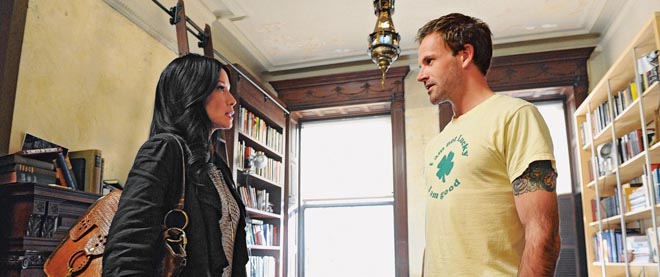A Holmes for our times
In an age when nerds rule, Sherlock the eccentric brainiac has sex appeal
David M. Russell/CBS
Share

Sherlock Holmes used to be a dour Victorian, and now he’s the detective who’s bringing sexy back. Or at least that’s the impression you’d get from the latest television trend: modern-day versions of Arthur Conan Doyle’s famous detective. Robert Downey Jr. was a younger-than-usual Holmes in the 2009 film version, but in recent TV adaptations Holmes is much cooler. People are watching Sherlock, the hit BBC drama starring 36-year-old Benedict Cumberbatch as a contemporary, computer-using Holmes, or they’re tuning in to Global to see Elementary, in which Holmes lives in New York and Watson is a female doctor. “I think the character of Sherlock Holmes is innately attractive,” says Naomi Roper, who runs a fan site for Cumberbatch. He’s even more attractive now that he’s been converted into a contemporary TV hero.
The traditional portrayal of Holmes is as a haughty intellectual with a bumbling sidekick. Aidan Quinn, who plays a key role on Elementary as a policeman who turns to Sherlock for help, says he “just knew Holmes from the Basil Rathbone movies,” in which the character was middle-aged and distant. The new Holmes shows have gone in another direction. Cumberbatch has become an international heartthrob, with fans dubbing themselves “Cumberbitches.” And in Elementary, Jonny Lee Miller’s Holmes is an anti-authoritarian rebel, particularly when it comes to wisecracks: Quinn says most of the humour is between Holmes and Watson, with Holmes exposing other characters as square and humourless.
How did Holmes go from old-school detective to modern-day super-nerd? It might help that his anti-social tendencies—Cumberbatch’s character describes himself as “a high-functioning sociopath”—are more popular today than they’ve ever been. Alexandra Sokoloff, author of the novel The Harrowing and a big fan of Cumberbatch’s Sherlock, points out that eccentric intellectuals are now respected. “In an age dominated by minds like Mark Zuckerberg, Bill Gates and the late Steve Jobs, the nerd is the new alpha male.” Holmes uses smarts rather than physical strength to fight his battles. “He’s going to show up the police,” Quinn notes. “He’s outwitting people who are bigger and stronger.”
Making a modern-day version of Holmes has an additional benefit for TV producers: instant publicity. Fans of Doyle’s original stories are fanatical and protective. When Quinn got the Elementary part, he discovered several friends were “rabid aficionados” who “sent me emails and texts about how much they thought they were going to hate the show, but they’re all loving it.” That kind of fan interest created tremendous buzz, negative and positive, around the premiere of Sherlock. And when Elementary came out, Sherlock fans accused it of imitating the BBC’s version, although Quinn says the rivalry only existed in the media. “I know that Benedict Cumberbatch gave Jonny his blessing and said, ‘Go for it.’ ” Networks would never get that kind of controversy by creating a young, sexy contemporary detective; by naming him Sherlock Holmes, their shows can be part of a well-known brand that isn’t under copyright.
Doing a modern Holmes show also may allow creators an excuse to move away from the graphic grittiness that has been a feature of most recent detective shows ever since CSI amped up the level of TV gore. On Elementary and Sherlock, they can indulge in a more old-fashioned type of detective story. “We live slightly in the realm of fantasy,” Quinn explains. “It’s more internal, it’s more cerebral, it’s more about the relationship of Watson and Holmes. We don’t want the blood and guts.” These shows are reviving Doyle’s gentlemanly style of mystery storytelling.
All that could mean the new idea of Holmes—a sexy nerd with no Victorian hang-ups who doesn’t necessarily live in England—could become the definitive version for millennials. After working on a modern Holmes show for only a few weeks, Quinn says the new take on the character is displacing the old one. “I see Sherlock Holmes more as Jonny Lee Miller now than anyone else. But,” he adds, “I still have Basil Rathbone in the back of my brain.”